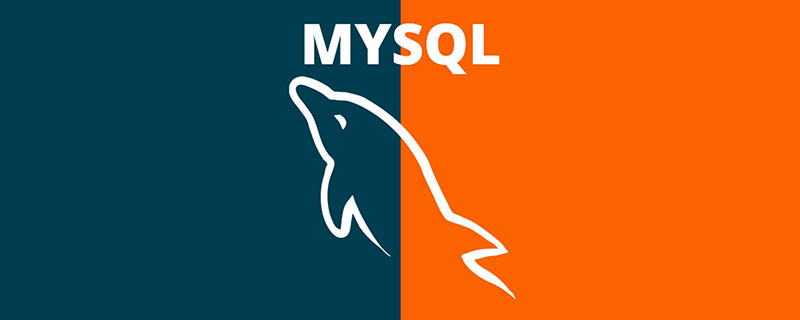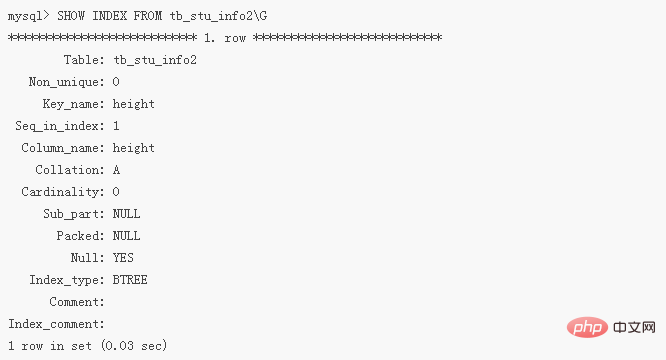How to modify the index type in mysql
Mysql method to modify the index type: 1. Use the "DROP INDEX index name ON table name;" statement to delete the original specified index; 2. Use "CREATE index type keyword INDEX index name ON table name (column Name [length])" statement creates an index with the same name to modify the type.

The operating environment of this tutorial: windows7 system, mysql8 version, Dell G3 computer.
There is no direct instruction to modify the index in MySQL. Generally, we need to delete the original index first, and then create an index with the same name as needed, so as to modify the index in disguise.
mysql Modify index type
#1. Delete the original index
When the index is no longer needed , you can use the DROP INDEX statement to delete the index.
Grammar format:
DROP INDEX <索引名> ON <表名>
The syntax description is as follows:
: The name of the index to be deleted. : Specify the table name where the index is located.
Example:
tb_stu_info2 Index information of the data table

It can be seen from the output results : "Key_name: height"--The name of the index is "height", "Index_type: BTREE"-The type used by the index is "BTREE"
Delete the index height in the table tb_stu_info2
DROP INDEX height ON tb_stu_info2;
Copy after login2. Create an index with the same name
You can use the CREATE INDEX statement specifically used to create an index to create an index on an existing table, but this statement cannot create a primary key.
Syntax format:
CREATE <索引名> INDEX ON <表名> (<列名> [<长度>] [ ASC | DESC])
Copy after loginThe syntax description is as follows:
: Specify the index name. A table can create multiple indexes, but each index has a unique name in the table. : Specify the name of the table to create an index.
: Specify the column name to create an index. You can usually consider using columns that frequently appear in the JOIN clause and WHERE clause in the query statement as index columns. : Optional. Specifies that the length characters preceding the column are used to create the index. Creating an index using part of a column can help reduce the size of the index file and save the space occupied by the index columns. In some cases, only the prefix of a column can be indexed. The length of an index column has a maximum limit of 255 bytes (1000 bytes for MyISAM and InnoDB tables). If the length of an index column exceeds this limit, it can only be indexed using the column's prefix. In addition, columns of type BLOB or TEXT must also use prefix indexes. ASC|DESC: Optional. ASC specifies that the index is sorted in ascending order, DESC specifies that the index is sorted in descending order, and the default is ASC.
Example:
Create a normal index
CREATE INDEX height ON tb_stu_info2 (height(8));
Copy after loginWhen creating a unique index, the UNIQUE keyword is usually used.
CREATE UNIQUE INDEX height ON tb_stu_info2 (height(8));
Copy after loginExpand knowledge:
The index types in MySQL are as follows
General Index
Unique index
Primary key index
Combined index
Full text index
[Related recommendations: mysql video tutorial]
The above is the detailed content of How to modify the index type in mysql. For more information, please follow other related articles on the PHP Chinese website!
Statement of this WebsiteThe content of this article is voluntarily contributed by netizens, and the copyright belongs to the original author. This site does not assume corresponding legal responsibility. If you find any content suspected of plagiarism or infringement, please contact admin@php.cn
Hot AI Tools

Undresser.AI Undress
AI-powered app for creating realistic nude photos

AI Clothes Remover
Online AI tool for removing clothes from photos.

Undress AI Tool
Undress images for free

Clothoff.io
AI clothes remover

Video Face Swap
Swap faces in any video effortlessly with our completely free AI face swap tool!

Hot Article
How to fix KB5055523 fails to install in Windows 11?3 weeks ago By DDDHow to fix KB5055518 fails to install in Windows 10?3 weeks ago By DDDRoblox: Dead Rails - How To Tame Wolves4 weeks ago By DDDRoblox: Grow A Garden - Complete Mutation Guide2 weeks ago By DDDStrength Levels for Every Enemy & Monster in R.E.P.O.4 weeks ago By 尊渡假赌尊渡假赌尊渡假赌
Hot Tools

Notepad++7.3.1
Easy-to-use and free code editor

SublimeText3 Chinese version
Chinese version, very easy to use

Zend Studio 13.0.1
Powerful PHP integrated development environment

Dreamweaver CS6
Visual web development tools

SublimeText3 Mac version
God-level code editing software (SublimeText3)

Hot Topics
Java Tutorial 1659
1659
 14
CakePHP Tutorial
14
CakePHP Tutorial 1416
1416
 52
Laravel Tutorial
52
Laravel Tutorial 1310
1310
 25
PHP Tutorial
25
PHP Tutorial 1258
1258
 29
C# Tutorial
29
C# Tutorial 1232
1232
 24
See all articles
24
See all articles MySQL's Role: Databases in Web Applications
Apr 17, 2025 am 12:23 AM
MySQL's Role: Databases in Web Applications
Apr 17, 2025 am 12:23 AM
The main role of MySQL in web applications is to store and manage data. 1.MySQL efficiently processes user information, product catalogs, transaction records and other data. 2. Through SQL query, developers can extract information from the database to generate dynamic content. 3.MySQL works based on the client-server model to ensure acceptable query speed.
 Laravel Introduction Example
Apr 18, 2025 pm 12:45 PM
Laravel Introduction Example
Apr 18, 2025 pm 12:45 PM
Laravel is a PHP framework for easy building of web applications. It provides a range of powerful features including: Installation: Install the Laravel CLI globally with Composer and create applications in the project directory. Routing: Define the relationship between the URL and the handler in routes/web.php. View: Create a view in resources/views to render the application's interface. Database Integration: Provides out-of-the-box integration with databases such as MySQL and uses migration to create and modify tables. Model and Controller: The model represents the database entity and the controller processes HTTP requests.
 How to start mysql by docker
Apr 15, 2025 pm 12:09 PM
How to start mysql by docker
Apr 15, 2025 pm 12:09 PM
The process of starting MySQL in Docker consists of the following steps: Pull the MySQL image to create and start the container, set the root user password, and map the port verification connection Create the database and the user grants all permissions to the database
 Solve database connection problem: a practical case of using minii/db library
Apr 18, 2025 am 07:09 AM
Solve database connection problem: a practical case of using minii/db library
Apr 18, 2025 am 07:09 AM
I encountered a tricky problem when developing a small application: the need to quickly integrate a lightweight database operation library. After trying multiple libraries, I found that they either have too much functionality or are not very compatible. Eventually, I found minii/db, a simplified version based on Yii2 that solved my problem perfectly.
 MySQL and phpMyAdmin: Core Features and Functions
Apr 22, 2025 am 12:12 AM
MySQL and phpMyAdmin: Core Features and Functions
Apr 22, 2025 am 12:12 AM
MySQL and phpMyAdmin are powerful database management tools. 1) MySQL is used to create databases and tables, and to execute DML and SQL queries. 2) phpMyAdmin provides an intuitive interface for database management, table structure management, data operations and user permission management.
 MySQL vs. Other Programming Languages: A Comparison
Apr 19, 2025 am 12:22 AM
MySQL vs. Other Programming Languages: A Comparison
Apr 19, 2025 am 12:22 AM
Compared with other programming languages, MySQL is mainly used to store and manage data, while other languages such as Python, Java, and C are used for logical processing and application development. MySQL is known for its high performance, scalability and cross-platform support, suitable for data management needs, while other languages have advantages in their respective fields such as data analytics, enterprise applications, and system programming.
 Laravel framework installation method
Apr 18, 2025 pm 12:54 PM
Laravel framework installation method
Apr 18, 2025 pm 12:54 PM
Article summary: This article provides detailed step-by-step instructions to guide readers on how to easily install the Laravel framework. Laravel is a powerful PHP framework that speeds up the development process of web applications. This tutorial covers the installation process from system requirements to configuring databases and setting up routing. By following these steps, readers can quickly and efficiently lay a solid foundation for their Laravel project.
 MySQL vs. Other Databases: Comparing the Options
Apr 15, 2025 am 12:08 AM
MySQL vs. Other Databases: Comparing the Options
Apr 15, 2025 am 12:08 AM
MySQL is suitable for web applications and content management systems and is popular for its open source, high performance and ease of use. 1) Compared with PostgreSQL, MySQL performs better in simple queries and high concurrent read operations. 2) Compared with Oracle, MySQL is more popular among small and medium-sized enterprises because of its open source and low cost. 3) Compared with Microsoft SQL Server, MySQL is more suitable for cross-platform applications. 4) Unlike MongoDB, MySQL is more suitable for structured data and transaction processing.























